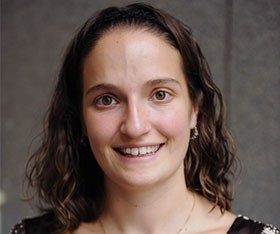Jayme Paullin, M.S.

Jayme Paullin
Associate Investigator
DuPont
B.S., Medicinal and Pharmaceutical Chemistry, University of the Sciences, Philadelphia
M.S., Analytical Chemistry, University of Delaware, Newark
Jayme Paullin began working as an Associate Investigator at DuPont shortly after she earned her M.S. degree. She found the position through working with the career services office at her school.
Her primary responsibility at DuPont is to synthesize polymer derivatives for testing in different market applications. Paullin and approximately 50 colleagues work in various subgroups supporting products and technologies that are in the R&D stage. One of the benefits of Paullin’s job is that, depending on the project, she may get to perform a variety of functions, from doing syntheses to participating in market analysis.
It's really difficult to figure out what you want to do with your life before you can experience it first, so pick something that has a couple different avenues for careers afterwards in case you change your mind.
Typical day on the job:
In a typical day I am mostly in the lab (65% of the time), running experiments and analyzing results from instrumentation. These experiments can include organic synthesis reactions, NMR, IR, size exclusion chromatography (SEC) and rheology, depending on what we’re investigating. Depending on the time of the year, 5-10% of the time I am writing reports; 15% of the time I am planning experiments; the final 10% of the time I am in meetings. I come into work and plan my experiments for the day. I then go into the lab and complete my experiments and analyze the data to make conclusions and determine future experiments. I also have weekly team meetings to determine priorities and share ideas.
Work environment:
I have my own office directly connected to a lab that I share with a lab partner. I work in both my office and the lab frequently. In my lab I have a fume hood, glassware, a rheometer, overhead mixer, homogenizer, several balances, conductivity meter, pH meter, and hot plate/magnetic stirrers.
Work schedule:
I typically work 40 hours a week. Sometimes I have to work more hours to get my work done, but my company offers flexible work time so I can make adjustments to my daily schedule depending on work or personal needs. If a meeting or experiment is running late or if flexibility is needed for personal reasons I am able to coordinate that with my supervisor. I am not strictly required to be at work from 9-5 every day. Some days it could be 7-3 and others it could be 10-6, it depends on what is going on that week. Overtime is not typically required. The pace of the job changes; sometimes there is a lot to do and it is fast-paced, and other times it is a bit slower.
Travel schedule:
I am not required to travel.
Tools you can’t live without:
Microsoft Office, Chem Draw, Brookfield rheometer, NMR, SEC and IR.
What you like most about your job:
I like that I am asked to use my educational background to solve problems. It is exciting to be working on something that could eventually be used in a commercial product.
Best productivity trick:
Multitasking. If there are multiple things you can do at once, your productivity is great. For example, since my lab and office are connected, I am frequently running experiments and writing up notebooks or planning future experiments at the same time.
Best career advice you’ve received:
It is good to help others out, but you also need to be able to say no. Prioritize your work and don't over-extend yourself. The best way to move up in your career is to do the job you are assigned well. People will notice and it will lead to future opportunities.
Skills or talents that make you a good fit for your job:
I am very organized and like to solve problems. Usually this problem-solving involves completing experiments and using that data to determine what to do next.
Is there anything else you would like to mention about your career:
Industrial jobs are a lot different than school. I need to be a lot more self-starting and independent than I was in school. While at times it is very challenging, it is also very rewarding.
Essential habit you wish you’d started earlier:
I wish I had put more effort in my communication skills. I am frequently required to give presentations on my work, and it took some time to discover the appropriate format and way to present to a group. In school, most of my presentations were to people with technical backgrounds, so I could use technical terms to explain any given topic. Here, my presentations are often to audiences that include non-technical colleagues, so I need to adjust the way I explain processes and findings. I’ve improved my communication abilities while I’ve worked here, and I feel like my work is better understood by my colleagues.
Favorite ACS resource:
The Journal of the American Chemical Society. Several times I have looked to the resource for information. It has a lot of valuable papers that have helped me in my career.
How you've benefited from being an ACS member:
As an ACS member, I have been able to attend ACS conferences where I have learned a lot from all of the great scientists involved in the organization.

